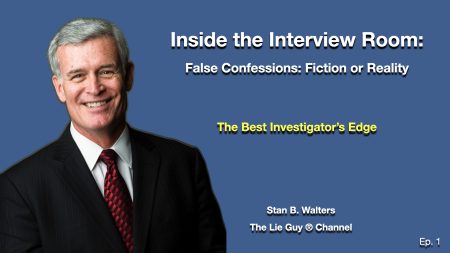Table of Contents
Interview and Interrogation Techniques
The Categories of Stress Behavior
By Stan B. Walters
(2003)
Stress Creating Events
Each of us experiences stress creating events on a regularly basis and in a large number of different settings. Everything from the simple aggravating issues of daily life up to and including the stress that is associated with creating and maintaining deception. The ability of the interviewer’s interview and interrogation techniques to be able to accurately diagnose deception rests on his or her knowledge of which stress behaviors. Which of those that are associated with deception versus those behaviors that are merely the result of “ambient stress” of the current interview setting.
Those individuals who fail at accurately identifying deception in other people invariably misidentify a large number of general stress behaviors as being signs of deception. At the same time failing to recognize reliable behavioral cues of deception. Understanding the classification of human stress indicators into the three basic categories of general, incriminating potential and discriminatory cues can dramatically improve the investigative interviewer’s interview and interrogation techniques used for deception detection accuracy.
General Stress
The “general ” category of stress cues is the largest and most diverse of all the three categories. These are behaviors that each of us experiences in varying degrees throughout our day. These cues are present when things are absolutely crazy in the mornings as everyone in the household scrambles to get ready for the day’s activities, or the project at work is going badly. The relationship with another person is deteriorating, the bills are late, or one of your children has come home early with a surprise case of the measles and you’ve never had them!
This is the type of stress we experience when we are at the bank applying for a loan or when we are at the restaurant and we’re worried that your credit card may be other limit and will be declined when we “pick up the tab.” It is these types of behaviors that we may describe as being nothing more than the “background” noise of human behaviors that goes on all the time.
Some of these symptoms include a louder voice along with higher voice pitch, agitated facial expressions, increased hand and arm behaviors and even a few speech flaws. They are by no means signs of deception yet are often seized upon by the eye of many untrained or ill-informed observers as reliable signs of deception. If these are signs of deception we all must be lying all the time!
Incriminating Potential
The “incriminating potential” category of stress cues tend to be more prolific than the “lie signs” but there is nowhere as many as those that populate the “general” stress category. These behaviors are more likely to be seen during moments of evasive response by a subject but will not specifically pinpoint to moment of deception by the speaker. The presence of these symptoms appears to be more scattered and not always recurring when the issue is raised at a later time by the interviewer and their interview and interrogation techniques. At the same time both truthful and deceptive subjects are capable of generating these cues but we find that deceptive subjects generate are far higher number of them overall during their general response to some form of inquiry. These can include stuttering, stammering, mumbling speech and general pausing. These symptoms much like the “general” category are problematic in that they are often inappropriately given far more weight toward an end analysis of specific deception. A more accurate analysis from observing these behaviors would be that the subject’s overall behavior “concerns” the interviewer therefore he or she should spend more time with the subject and ask in-depth questions regarding the specifics of the issue under investigation and watch to see if the subject begins to generate the stress signals that are capable of isolating the stress behaviors associated with deception.
Discriminatory Stress
The “discriminatory” category of stress cues are those behaviors that when observed under stringent scientific conditions have been found to be highly reliable in marking moments of deception. It is this category that we focus on a great deal in Practical Kinesic Interview & Interrogation courses. With a good understanding of the “general” and “incriminating” stress categories, the stress behaviors associated with deception become more obvious. The interviewer will find this category populated with nonverbal behaviors such as aversion, negation, contradictions, and to some extent performance and control cues. Verbal cues include the content category of “denial” as well as elements seem in the presentation of an “unclear thought line” or cognitive dissonance.
Conclusions
In-depth knowledge of the “incriminating” and “discriminatory” categories along with accurate recognition of their occurrences can dramatically improve the observer’s interview and interrogation techniques’ ability to spot deception. Just as critical however is to understand the significance of the general stress behaviors. These cues can tell the interviewer a lot about the subject’s current emotional and cognitive state as well as the strength of the emotion being expressed. These cues can guide the interviewer through the entire interview and allow him or her to maintain control over the flow of information and improve the quality of communication. At the same time, the interviewer must still understand that “general” stress cues will often “populate” a deception cluster and can indicate level of severity of stress the subject is experiencing while perpetrating the lie.
Stan B. Walters
